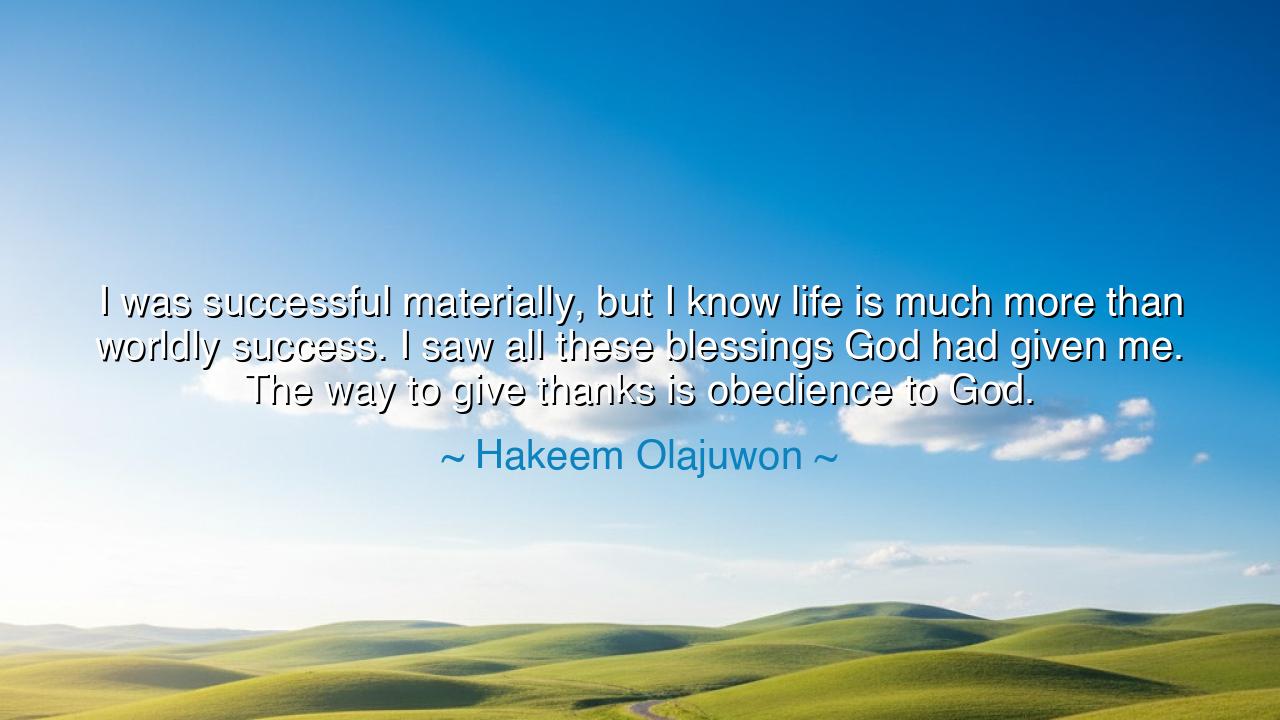
I was successful materially, but I know life is much more than
I was successful materially, but I know life is much more than worldly success. I saw all these blessings God had given me. The way to give thanks is obedience to God.






Hear the words of Hakeem Olajuwon, the great warrior of the court, whose hands once carved victory from leather and air, yet whose heart turned toward the eternal: “I was successful materially, but I know life is much more than worldly success. I saw all these blessings God had given me. The way to give thanks is obedience to God.” These words are not the boasts of a champion but the confession of a man who discovered that true greatness does not lie in trophies or gold, but in reverence and obedience to the One who grants all things.
The first jewel in his words is the recognition of material success. Olajuwon stood at the heights of his profession, crowned with victories, wealth, and renown. Yet he declares that such worldly success, while real, is not the fullness of life. How many men have sought riches, only to find emptiness? How many have gained fame, only to lose themselves? His wisdom reminds us that the material crown is fleeting; the eternal crown lies elsewhere.
The second flame is his vision of blessings. He did not imagine his fortune came by his own strength alone. His eyes were opened to see that every gift—talent, opportunity, victory, even breath itself—was given by God. In this humility, he teaches that success is not merely the fruit of effort, but of divine providence. To see life as blessing is to walk with open eyes, no longer blinded by pride but illuminated by grace.
The third truth is his definition of true thanksgiving: not words alone, not fleeting emotions, but obedience to God. Gratitude that does not shape the life is shallow; gratitude that leads to obedience is deep. Olajuwon declares that the way to honor the Giver is not by empty praise but by walking in the path He has set. This is ancient wisdom echoed by prophets and sages: “To obey is better than sacrifice.” True thanks is lived, not spoken.
History gives us a mirror in the life of Solomon, king of Israel, who was granted wisdom, wealth, and honor beyond measure. When he obeyed, his blessings multiplied, and his kingdom shone as a beacon. Yet when he turned to disobedience, his kingdom fractured, and his glory faded. His story stands beside Olajuwon’s words, a testimony that obedience is the safeguard of blessings, while disobedience is the road to ruin.
The fourth jewel is the heroic turning of a heart from the temporal to the eternal. Olajuwon’s insight is not only for athletes, but for all who chase success. He proclaims that beyond the applause of men, there is the gaze of God. Beyond the wealth of earth, there is the treasure of heaven. To live for material success alone is to labor for shadows; to live in obedience to God is to labor for everlasting light.
The lesson is clear: do not be deceived by worldly success. Count your blessings as gifts, not entitlements. Let your gratitude move beyond words into obedience—obedience in love, obedience in integrity, obedience in service to God and man. In this way, your success will not fade with time, but will echo into eternity.
Practically, begin by naming your blessings, great and small, and acknowledge them as divine gifts. Then ask yourself: How can I honor the Giver with my life? Live with integrity in your work, humility in your victories, and reverence in your choices. Let your actions, not only your words, be your thanksgiving. For as Olajuwon teaches, the highest way to give thanks is not merely to feel it, but to live it—in obedience to God.






AAdministratorAdministrator
Welcome, honored guests. Please leave a comment, we will respond soon